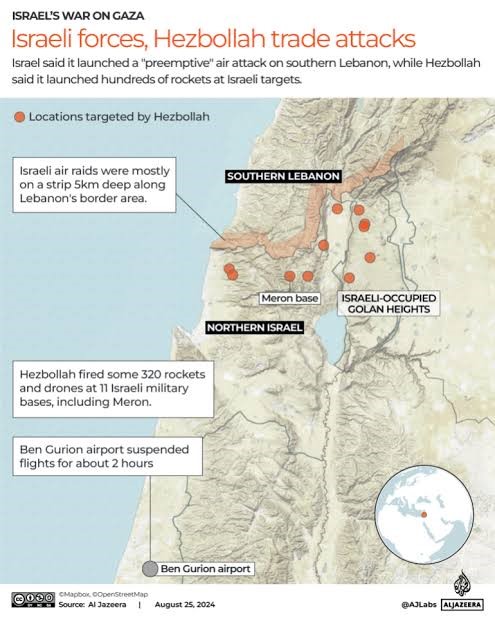The Escalation in West Asia
Syllabus:
GS 2:
- India and its neighbourhood relation
- Current Events of National and International Importance Bilateral , Regional and Global Grouping and Agreements involving India and/or affecting India.
Why in the News?
The recent escalation between Israel and Hezbollah, marked by coordinated attacks across Lebanon and Syria, threatens to draw Iran and the United States into a broader regional conflict, posing significant diplomatic challenges for global powers, including India.
Overview of Escalation in West Asia:
- New Phase: Israel’s recent attacks on Hezbollah leaders signal a new phase in its regional conflict, threatening a wider West Asian conflict involving Iran and the US.
- Deadly Strikes: Coordinated attacks across Lebanon and Syria killed at least 37 people and injured over 3,500, escalating tensions between Hezbollah and Israel.
- Hezbollah Reaction: Hezbollah’s leader, Hassan Nasrallah, called the attacks a declaration of war, increasing fears of retaliation from both Hezbollah and Iran.
- Conflict Spread: The possibility of a wider conflict could draw Iran into direct confrontation, potentially involving the United States and further destabilizing the region.
- India’s Concerns: India faces significant diplomatic challenges, balancing its relationships with both Israel and the Arab world amid escalating violence in West Asia.
Context of the Gaza War:
- Hamas Attacks: The current conflict escalated after Hamas attacked southern Israel on October 7, killing 1,200 Israelis and taking 250 hostages, prompting a large-scale Israeli retaliation.
- Massive Retaliation: Israel’s response, consisting of airstrikes and ground operations, has resulted in over 41,000 Palestinian deaths in Gaza so far, highlighting the conflict’s human toll.
- Hezbollah’s Role: Throughout the war, Hezbollah has engaged in rocket fire along Israel’s northern border, contributing to the displacement of thousands of Israelis and Lebanese.
- Civilian Impact: The conflict has displaced over 63,000 Israelis and 95,000 Lebanese, emphasizing the severe humanitarian consequences of ongoing hostilities.
- Hostage Crisis: Despite extensive military operations, around 100 hostages remain in Hamas captivity, adding further complications to the already tense situation.
Signals of Escalation:
- War Goals: Israel’s updated war goals include the return of displaced Israelis, the destruction of Hamas, and securing the release of hostages, signaling intensified military efforts.
- Military Action: Israel’s Defence Minister, Yoav Gallant, emphasized the necessity of military action to ensure the return of northern Israeli communities to their homes.
- Hezbollah Targets: Israel’s recent attacks on Hezbollah’s communication networks aim to degrade the group’s command structure, targeting top-level members of Hezbollah’s leadership.
- Shifting Focus: With Hamas largely weakened, Israel is now turning its attention to Hezbollah, which it views as a more powerful adversary to be tackled in the north.
- Retaliation Likely: Hezbollah is expected to retaliate at a time of its choosing, while Israel is prepared for further military operations, potentially escalating into a broader conflict.
Pivot to the North:
- Hezbollah Targeting: Israel’s recent targeting of Hezbollah’s leaders and command structures marks a significant shift in focus from Gaza to northern Lebanon.
- Strategic Shift: With Hamas’s military capabilities significantly degraded, Israel now believes it can focus more efforts on neutralizing Hezbollah’s influence.
- Leadership Losses: The Israeli airstrike killing Hezbollah commander Fuad Shukr in Beirut indicates a broader strategy of eliminating key figures in Hezbollah’s leadership.
- Hezbollah Command: The destruction of Hezbollah’s communication systems disrupts its military operations, dealing a blow to the group’s overall command structure.
- Iranian Involvement: These attacks are also a signal to Iran, Hezbollah’s main backer, that Israel is willing to strike deep into enemy territory, raising the stakes for Tehran.
Fallout of the Attacks:
- Hezbollah Retaliation: Hezbollah is expected to retaliate, increasing the risk of an expanded conflict, potentially involving Iran and destabilizing the broader
- UN Concerns: UN Secretary-General António Guterres expressed concern about a dramatic escalation, urging all parties to avoid further conflict in Lebanon.
- Multiple Scenarios: Iran could retaliate through Hezbollah, Hamas, or the Houthis in Yemen, or target Israeli officials abroad, further complicating regional stability.
- Israeli Response: Israel may launch further airstrikes or ground incursions into Lebanon, targeting Hezbollah strongholds and attempting to establish a buffer zone.
- India’s Position: India remains cautious, concerned about the safety of its 9 million citizens in the region and the potential impact on its energy security and diplomatic relations.
Way Forward:
- Diplomatic Mediation: International stakeholders, including the UN and regional actors, must prioritize diplomatic efforts to de-escalate tensions and broker a ceasefire between Israel and Hezbollah to prevent further escalation.
- Engagement with Iran: Global powers, particularly the US, should engage Iran diplomatically to reduce its involvement in regional conflicts and prevent its retaliation through Hezbollah or allied militant groups.
- Strengthening Humanitarian Aid: Immediate focus should be placed on providing humanitarian assistance to displaced populations in both Israel and Lebanon, ensuring that civilians are protected from further harm.
- Regional Dialogue: West Asian countries must initiate dialogues focused on reducing military engagements and finding long-term solutions to recurring conflicts between Israel and its neighboring adversaries.
- Focus on Energy Security: Countries dependent on West Asian energy resources, including India, should diversify energy supply chains and enhance domestic energy security measures to mitigate the impact of potential disruptions.
- India’s Role: India should continue to engage diplomatically with both Israel and Iran, using its neutral stance to foster peace negotiations while ensuring the safety of its citizens in the region.
Conclusion:
The escalation in West Asia poses severe risks to regional stability and global diplomacy. Swift, coordinated international action is necessary to prevent further violence and foster long-term peace in this volatile region.
Source: Indian Express
Mains Practice Question:
“Examine the implications of the recent Israel-Hezbollah conflict escalation on India’s foreign policy and energy security. Suggest measures India can adopt to safeguard its interests in the region.”




